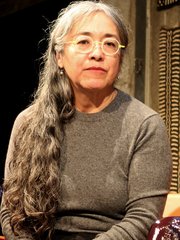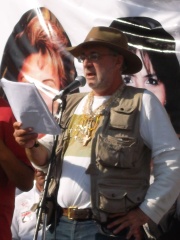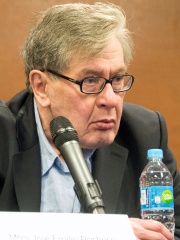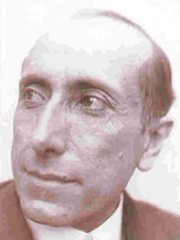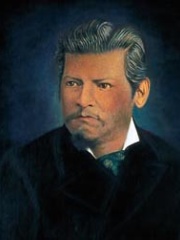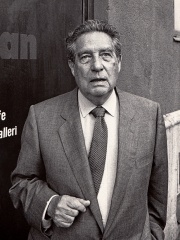
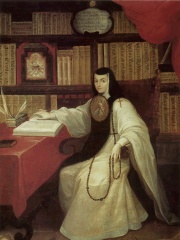
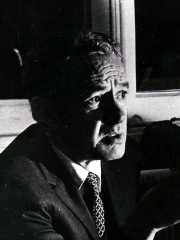
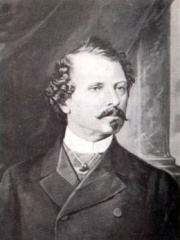

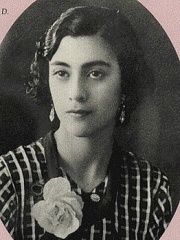
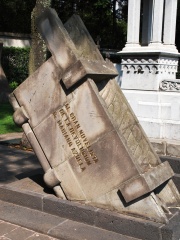
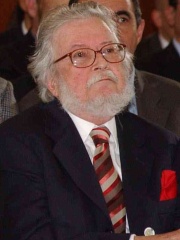
The Most Famous
WRITERS from Mexico
Top 10
The following people are considered by Pantheon to be the top 10 most legendary Mexican Writers of all time. This list of famous Mexican Writers is sorted by HPI (Historical Popularity Index), a metric that aggregates information on a biography's online popularity. Visit the rankings page to view the entire list of Mexican Writers.

1. Octavio Paz (1914 - 1998)
With an HPI of 74.17, Octavio Paz is the most famous Mexican Writer. His biography has been translated into 95 different languages on wikipedia.
Octavio Paz Lozano (March 31, 1914 – April 19, 1998) was a Mexican poet and diplomat. For his body of work, he was awarded the 1977 Jerusalem Prize, the 1981 Miguel de Cervantes Prize, the 1982 Neustadt International Prize for Literature, and the 1990 Nobel Prize in Literature.

2. Juana Inés de la Cruz (1648 - 1695)
With an HPI of 71.71, Juana Inés de la Cruz is the 2nd most famous Mexican Writer. Her biography has been translated into 62 different languages.
Juana Inés de Asbaje y Ramírez de Santillana, better known as Sor Juana Inés de la Cruz (12 November 1648 – 17 April 1695), was a Hieronymite nun and a Novohispanic writer, philosopher, composer and poet of the Baroque period, nicknamed "The Tenth Muse", "The Mexican Phoenix", and "The Phoenix of America" by her contemporary critics. She was also a student of science. She was among the main contributors to the Spanish Golden Age, alongside Juan de Espinosa Medrano, Juan Ruiz de Alarcón and Garcilaso de la Vega "el Inca", and is considered one of the most important female writers in Spanish language literature and Mexican literature. Sor Juana has been significant to many communities across time, having been presented as a candidate for Catholic sainthood; a symbol of Mexican nationalism; and a paragon of freedom of speech, women's rights, and sexual diversity, making her a figure of great controversy and debate to this day.

3. Juan Rulfo (1917 - 1986)
With an HPI of 67.52, Juan Rulfo is the 3rd most famous Mexican Writer. His biography has been translated into 52 different languages.
Juan Nepomuceno Carlos Pérez Rulfo Vizcaíno, best known as Juan Rulfo (Spanish: [ˈxwan ˈrulfo] ; 16 May 1917 – 7 January 1986), was a Mexican writer, screenwriter, and photographer. He is best known for two literary works, the 1955 novel Pedro Páramo, and the collection of short stories El llano en llamas (The Burning Plain, 1953). In spite of Rulfo's slim literary production, he is considered one of the greatest Mexican and Latin American writers of the twentieth century who has influenced many subsequent writers including the Nobel laureate Gabriel García Márquez.

4. Thomas Mayne Reid (1818 - 1883)
With an HPI of 66.66, Thomas Mayne Reid is the 4th most famous Mexican Writer. His biography has been translated into 35 different languages.
Thomas Mayne Reid (4 April 1818 – 22 October 1883) was an Irish British novelist who fought in the Mexican–American War (1846–1848). His many works on American life describe colonial policy in the American colonies, the horrors of slave labour, and the lives of American Indians. "Captain" Reid wrote adventure novels akin to those by Frederick Marryat (1792–1848), and Robert Louis Stevenson (1850–1894). They were set mainly in the American West, Mexico, South Africa, the Himalayas, and Jamaica. He was an admirer of Lord Byron. His novel Quadroon (1856), an anti-slavery work, was later adapted as a play entitled The Octoroon (1859) by Dion Boucicault and produced in New York. While Reid's novels have become almost completely forgotten in the Anglosphere, they have remained popular in Eastern Europe and particularly in Russia (beginning in tsarist times), being considered a part of the canon of Western literature and being published under the category of "World Classics" along with Jack London and James Fenimore Cooper.
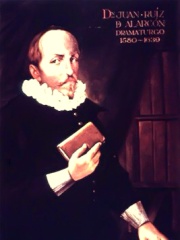
5. Juan Ruiz de Alarcón (1581 - 1639)
With an HPI of 62.68, Juan Ruiz de Alarcón is the 5th most famous Mexican Writer. His biography has been translated into 30 different languages.
Juan Ruiz de Alarcón (c. 1581 – 4 August 1639) was a New Spanish writer of the Golden Age who cultivated different variants of dramaturgy. His works include the comedy La verdad sospechosa (es), which is considered a masterpiece of Latin American Baroque theater.

6. Laura Esquivel (b. 1950)
With an HPI of 62.28, Laura Esquivel is the 6th most famous Mexican Writer. Her biography has been translated into 37 different languages.
Laura Beatriz Esquivel Valdés (born 30 September 1950) is a Mexican novelist, screenwriter and politician, who served in the Chamber of Deputies for the Morena Party from 2015 to 2018. Her first novel Como agua para chocolate (Like Water for Chocolate) became a bestseller in Mexico and the United States, and was later developed into an award-winning film.

7. Rosario Castellanos (1925 - 1974)
With an HPI of 61.41, Rosario Castellanos is the 7th most famous Mexican Writer. Her biography has been translated into 37 different languages.
Rosario Castellanos Figueroa (Spanish pronunciation: [roˈsaɾjo kasteˈʝanos]; 25 May 1925 – 7 August 1974) was a Mexican poet and author. She was one of Mexico's most important literary voices in the 20th century. Throughout her life, she wrote eloquently about issues of cultural and gender oppression, and her work has influenced Mexican feminist theory and cultural studies. Though she died young, she opened the door of Mexican literature to women, and left a legacy that still resonates today.

8. Mariano Azuela (1873 - 1952)
With an HPI of 59.32, Mariano Azuela is the 8th most famous Mexican Writer. His biography has been translated into 27 different languages.
Mariano Azuela González (January 1, 1873 – March 1, 1952) was a Mexican writer and medical doctor, best known for his fictional stories of the Mexican Revolution of 1910. He wrote novels, works for theatre and literary criticism. He is the first of the "novelists of the Revolution," and he influenced other Mexican novelists of social protest. Among Azuela's first published writing were some short pieces for the magazine Gil Blas Cómico, where he wrote under the pen name of "Beleño", and his writing published under the heading Impresiones de un estudiante (Impressions of a Student) in 1896. His first novel, Maria Luisa, was written in 1907, followed by Los fracasados (The Failures) in 1908, and Mala yerba (Weeds) in 1909. The theme of his beginning novels are about fate. He wrote of the social life of Mexicans during the Díaz dictatorship. After experiencing the Mexican Revolution first-hand, his writing style became sarcastic and disillusioned. His first novel with the Revolution theme is Andrés Pérez, maderista in 1911, followed by Sin Amor (Without Love) in 1912, and his most popular, Los de abajo (The Underdogs) in 1915. He continued to write short works and novels influenced by the Revolution. It includes El camarada Pantoja (Comrade Pantoja) in 1937, Regina Landa in 1939, La nueva burguesía (The New Bourgeoisie) in 1941, and La maldición (The Curse, published posthumously) in 1955. These works mainly depicts the satirical picture of life in post revolutionary Mexico sharply and angrily stigmatizing demagoguery and political intrigue.

9. Fernando del Paso (1935 - 2018)
With an HPI of 59.05, Fernando del Paso is the 9th most famous Mexican Writer. His biography has been translated into 30 different languages.
Fernando del Paso Morante (April 1, 1935 – November 14, 2018) was a Mexican novelist, essayist, and poet.
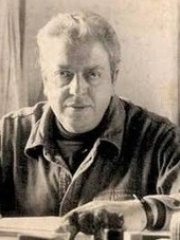
10. Jorge Ibargüengoitia (1928 - 1983)
With an HPI of 58.75, Jorge Ibargüengoitia is the 10th most famous Mexican Writer. His biography has been translated into 20 different languages.
Jorge Ibargüengoitia Antillón (January 22, 1928 – November 27, 1983) was a Mexican novelist and playwright who achieved great popular and critical success with his satires, three of which have appeared in English: The Dead Girls, Two Crimes, and The Lightning of August. His plays include Susana y los Jóvenes and Ante varias esfinges, both dating from the 1950s. His work also includes short stories and chronicles. He is considered one of the most influential writers in Latin American literature. Ibargüengoitia was born in Guanajuato, Mexico. In 1955, he received a Rockefeller grant to study in New York City; five years later he received the Mexico City literary award. He died in Avianca Flight 011, which crashed on November 27, 1983, while it attempted to land in Madrid, Spain.
People
Pantheon has 30 people classified as Mexican writers born between 1581 and 1997. Of these 30, 11 (36.67%) of them are still alive today. The most famous living Mexican writers include Laura Esquivel, Don Miguel Ruiz, and Guillermo Arriaga. The most famous deceased Mexican writers include Octavio Paz, Juana Inés de la Cruz, and Juan Rulfo. As of April 2024, 1 new Mexican writers have been added to Pantheon including Cristina Rivera Garza.
Living Mexican Writers
Go to all RankingsLaura Esquivel
1950 - Present
HPI: 62.28
Don Miguel Ruiz
1952 - Present
HPI: 57.75
Guillermo Arriaga
1958 - Present
HPI: 56.52
Cesar Millan
1969 - Present
HPI: 56.38
Cristina Rivera Garza
1964 - Present
HPI: 51.11
Carlton Cuse
1959 - Present
HPI: 49.35
Sabina Berman
1955 - Present
HPI: 49.28
Javier Sicilia
1956 - Present
HPI: 46.36
Jorge Volpi
1968 - Present
HPI: 45.61
Valeria Luiselli
1983 - Present
HPI: 42.54
Alejandro Rejon Huchin
1997 - Present
HPI: 40.50
Deceased Mexican Writers
Go to all RankingsOctavio Paz
1914 - 1998
HPI: 74.17
Juana Inés de la Cruz
1648 - 1695
HPI: 71.71
Juan Rulfo
1917 - 1986
HPI: 67.52
Thomas Mayne Reid
1818 - 1883
HPI: 66.66
Juan Ruiz de Alarcón
1581 - 1639
HPI: 62.68
Rosario Castellanos
1925 - 1974
HPI: 61.41
Mariano Azuela
1873 - 1952
HPI: 59.32
Fernando del Paso
1935 - 2018
HPI: 59.05
Jorge Ibargüengoitia
1928 - 1983
HPI: 58.75
José Emilio Pacheco
1939 - 2014
HPI: 58.36
Amado Nervo
1870 - 1919
HPI: 57.58
Ignacio Manuel Altamirano
1834 - 1893
HPI: 56.47
Newly Added Mexican Writers (2025)
Go to all RankingsOverlapping Lives
Which Writers were alive at the same time? This visualization shows the lifespans of the 15 most globally memorable Writers since 1700.




